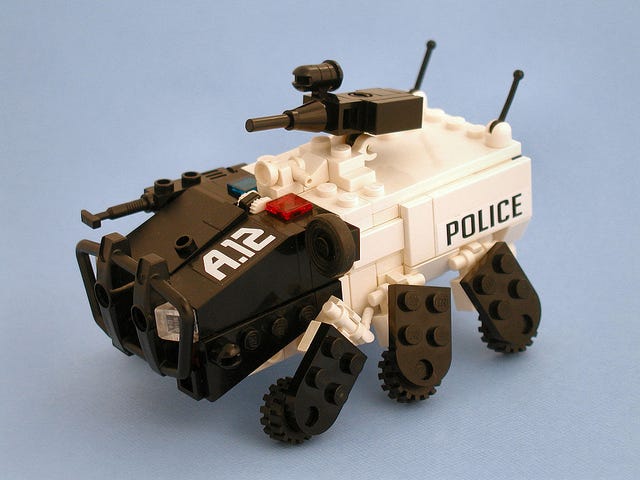
‘Repressor’ UGV by Lord Dane licensed under CC BY-NC 2.0
An Order from the Punjab and Haryana High Court raises questions as to the ability of law enforcement to investigate offences under the Information Technology Act, 2000. In a Petition titled as Gurmeet Kaur v. State Of Punjab, the Petitioner requested the investigation of the case to be shifted from the Investigation Officer (IO), on the grounds that, “[he] is not having any expertise or skill to unfold the offence which essentially falls in the domain of the [Information Technology] Act”.
A Speaking Order
Though the Order does not contain any hint as to the facts from which the offence is alleged to have occurred it does mention Sec. 67 of the Information Technology Act, 2000 as well as Sections 294, 500 & 501 of the Indian Penal Code, 1860. The sections above show its probably a case of criminal defamation (since sec. 294 makes obscene acts and songs punishable and 500 and 501 relate the offence of defamation under the IPC), which occurred through the internet (sec. 67 of the IT Act- publishing of information which is obscene in electronic form).
The court allowing the petition states in order dated 13th February, 2012 that:
Mr. Bhullar, after going through the contents of the petition, submits that Deputy Superintendent of Police, Police Station Samrala, District Ludhiana, shall entrust investigation of the case to one of the Investigating Officers, who is well conversant with the offences of information technology and has necessary expertise & skills….Learned counsel for the petitioner submits that in terms of the statement made by learned counsel for the State, the present petition may be disposed of.
The question arises whether this is an isolated case or is this symptomatic of a wider discomfort and inability of law enforcement to investigate offences under the Information Technology Act, 2000.
Experiences in Delhi
Even though the Information Technology Act, 2000 (as amended in 2008) contains several offences which contemplate criminal sanctions, it piggybacks on the conventional criminal legal process as set out under the Code of Criminal Procedure, 1973.
There used to be a departure from this under Sec. 78 of the Information Technology Act, 2000 which set out that an offence under the IT Act will not be investigated by an officer holding a rank not less than a DSP. However this was changed through the 2008 amendment to the law, which stated that this was not necessary and even an inspector could investigate such offences. The reasoning for the original section appeared to be that police officers below the rank of DSP would not be qualified enough to investigate cyber crimes. However, even now one finds that not much has changed and law enforcement remains oblivious as to the tools and the processes to be employed to investigate a cyber crime.
My personal experience of dealing with law enforcement is in the same vein as expressed by the Hon’ble Punjab and Haryana High Court. Even today, complaints on cyber crimes can be made to any police station however most of them do not have the capability and the tools to investigate the offence due to which often the complaint is closed and a FIR is not even registered. To remedy this situation a specialized cyber crime cell (under the economic offences wing) has been constituted by the Delhi Police. However, is one cyber crime cell adequate to deal with the rise in cyber crimes in a bursting metropolis ? Wont a systematic system of training for investigation of cyber crimes and making the necessary forensic equipment to a larger police cadre help ?
Ever filed a complaint for a cyber crime ? Whats been your experience ?